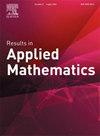Accelerated Restricted Additive Schwarz method for asynchronous processing
IF 1.3
Q2 MATHEMATICS, APPLIED
引用次数: 0
Abstract
This paper examines the parallel efficiency of both synchronous and asynchronous domain decomposition methods (DDMs), when solving algebraic systems derived from the discretization of partial differential equations (PDEs). We consider two separate approaches. First, we use the Restricted Additive Schwarz (RAS) domain decomposition solver as our primary DDM. Second, we integrate an acceleration method to minimize computational costs. For both approaches, we assess the parallel efficiency through various numerical experiments. Our results indicate that the asynchronous method provides a significant improvement in computational speed compared to the synchronous method, especially in large-scale problems. Additionally, the integration of the acceleration method further enhances the performance, reducing the overall computational time.
异步处理的加速受限加性Schwarz方法
本文研究了同步和异步域分解方法(DDMs)在求解由偏微分方程(PDEs)离散化导出的代数系统时的并行效率。我们考虑两种不同的方法。首先,我们使用限制加性Schwarz (RAS)域分解求解器作为我们的主要DDM。其次,我们整合了一种加速方法来最小化计算成本。对于这两种方法,我们通过各种数值实验来评估并行效率。我们的研究结果表明,与同步方法相比,异步方法在计算速度上有显着提高,特别是在大规模问题中。此外,加速方法的集成进一步提高了性能,减少了总体计算时间。
本文章由计算机程序翻译,如有差异,请以英文原文为准。
求助全文
约1分钟内获得全文
求助全文
来源期刊

Results in Applied Mathematics
Mathematics-Applied Mathematics
CiteScore
3.20
自引率
10.00%
发文量
50
审稿时长
23 days
 求助内容:
求助内容: 应助结果提醒方式:
应助结果提醒方式:


